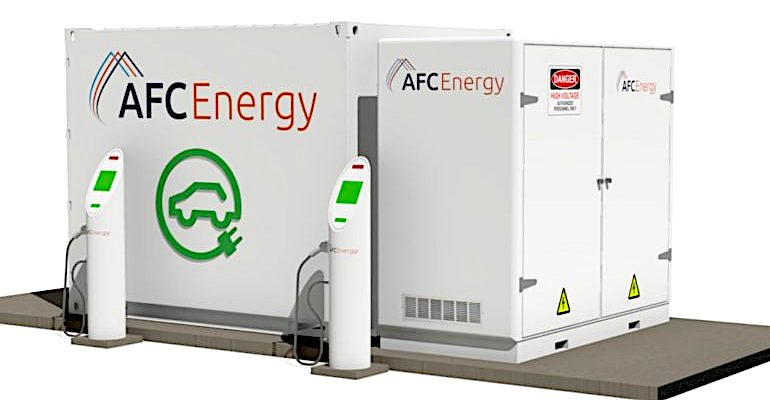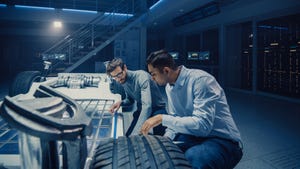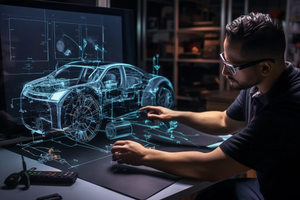Using Hydrogen to Power Fast EV Chargers
ABB and AFC Energy have created a partnership to create off-grid high-power EV charging stations, powered by hydrogen fuel cells.
February 4, 2021

One problem with building out an infrastructure of electric vehicle (EV) charging stations is they must be placed in locations with access to high power electricity transmission lines. This is especially true for DC fast charging networks where the charging system can be capable of outputs of 250 kilowatts (kW) or more. This limits the terrain and locations where high-power chargers can be deployed.
One solution to this problem is the use of large diesel generators to power charging stations. The obvious problem with this solution is the fossil fuel used to generate electricity produces significant levels of carbon dioxide (CO2) and air pollution in the form of particulate matter and oxides of nitrogen (NOx). If the purpose of operating EVs is to reduce air pollution and greenhouse gas (GHG) emissions, then the diesel option is a dead end.
The Solution Could Be Hydrogen
That’s where a new idea, put forward by ABB comes into play. The Swiss technology leader is working with a UK-based company called AFC Energy, which specializes in scalable hydrogen fuel cell technology. According to a news release from ABB, “Utilizing ABB’s energy storage solution and market-leading DC electric vehicle fast chargers along with AFC Energy’s zero-emission, high-efficiency hydrogen fuel cell, the strategic collaboration will deliver a fully autonomous, high power EV charging system, to provide an end-to-end solution for high power charging sites with limited grid connection.”
Frank Muehlon, Head of ABB’s global business for E-mobility Infrastructure Solutions at ABB, said: “ABB has led the way in e-mobility solutions and is proud to have played a key role in driving EV adoption rates across the world. This partnership with AFC Energy allows us to continue to push the boundaries of e-mobility, specifically targeting off-grid applications and thus enabling a much wider reach of e-mobility based on clean energy.”
Zero Emission Alternative
AFC Energy is a leading provider of hydrogen power generation technology, which can provide clean electricity for on and off-grid applications. The project with ABB provides power for charging infrastructure where traditionally a diesel generator would be used. Adam Bond, Chief Executive Officer at AFC Energy, said, “This strategic partnership is fully aligned with AFC Energy’s go to market strategy, with ABB providing strong and credible access to key customer channels both in Europe and overseas.”
Bond went on to say, “It will bring to market a unique, zero-emission solution powered by world leaders in electrification and alkaline fuel cell technologies, to enable deployment of future high power EV charging infrastructure. This is a key step on the journey to full decarbonization of mobility and transport across the globe, as we continue to drive down costs and further increase manufacturing scale underwritten by emerging global market opportunities”.
“At ABB we believe that sustainable development means progress towards a healthier and more prosperous world today and for future generations. It is through innovative applications of technology such as this partnership with AFC Energy that we can enable a low-carbon society. AFC Energy is uniquely positioned with their cost-effective alkaline-based fuel cell technology, which makes it a perfect match,” Muehlon said. “Our partnership with AFC Energy offers potential beyond the traditional EV market. The DC fast-charging system will have applications for commercial and logistics carriers, marine and urban transport. Sustainable solutions are also being developed for other growing segments like data centers and utilities to enable optimized carbon footprint,” he added.
The Devil in the Hydrogen Details
In principle, the use of hydrogen fuel cells to power EV chargers seems a good plan. Recall that a fuel cell combines oxygen and hydrogen using a catalyst to create electricity with heat and water vapor as the only byproducts. As usual, the complication comes from the details. The hydrogen needed for effective fuel cell operation is Ultra-Pure Scientific Grade (99.999% pure H2) and is more expensive than industrial grades. Fortunately, AFC Energy claims that their alkaline fuel cells are capable of operating on lower industrial grades of H2 and use catalytic metals that are less expensive than those used in a traditional fuel cell.
At present 95% of hydrogen production worldwide comes through the processing of fossil fuels, including natural gas and coal, using a process called steam methane reforming (SMR) at a cost of significant greenhouse gas emissions. A greener way to produce hydrogen is with Proton Exchange Membrane (PEM) electrolysis, which uses electricity to separate hydrogen from water.
In this process, there are no CO2 emissions when the electricity used comes from renewables like wind and solar. According to Shell, the efficiency of an electrolyzer is between 60% and 80%, so a significant quantity of renewable electricity is needed for a full-scale hydrogen production plant. This so-called Green Hydrogen is seen as playing a vital role in the decarbonization of energy systems, with at least 10 countries working to develop the resource, but it will take time and investment.
The collaboration between ABB and AFC Energy has a goal of providing an off-grid charging infrastructure with a secure, efficient, flexible, and reliable local power supply, and with zero emissions, to be ready for deployment in the UK, Europe, and the United States, by the second half of 2021.
Kevin Clemens is an engineering consultant who has worked on automotive and environmental projects for more than 40 years.
About the Author(s)
You May Also Like





